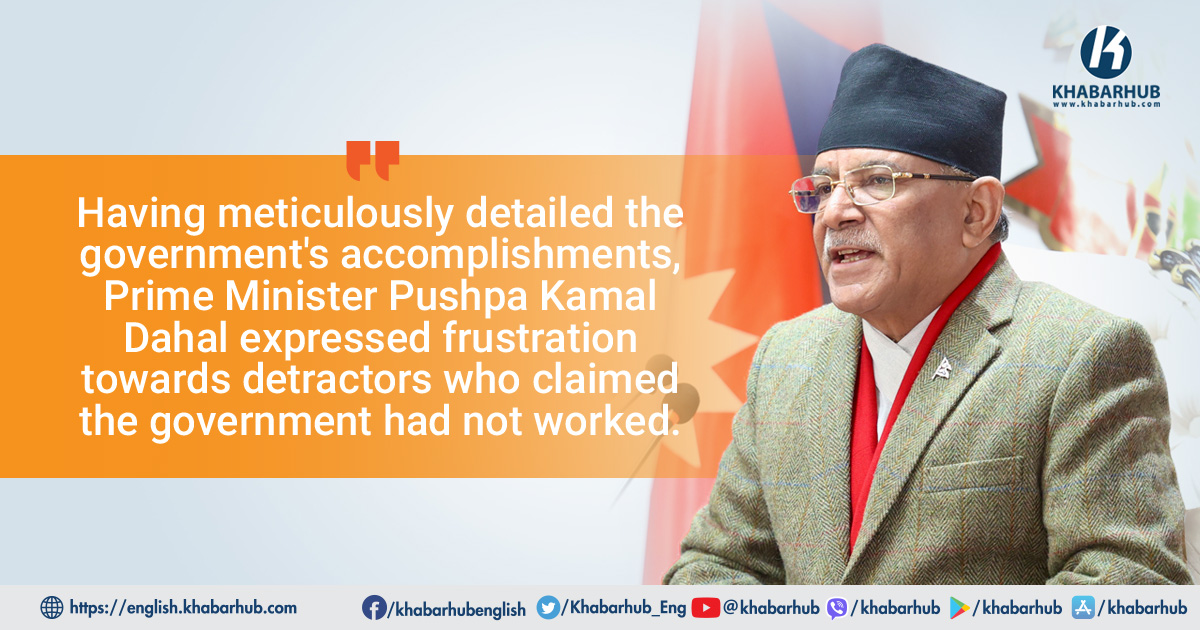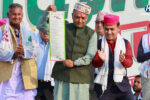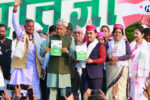KATHMANDU: Prime Minister (PM) Pushpa Kamal Dahal ‘Prachanda’ on Tuesday delivered a speech marked by a blend of enthusiasm, achievements, and grievances, characteristic of his leadership style that often invites skepticism.
Expressing concern about prevalent sentiments of inferiority and negativity in society, PM Dahal lamented the stifling effect on Nepali creativity asking, “Is our nation spiraling into utter hopelessness?”
As always, Prime Minister Dahal, who is recognized as a leader with false promises, seemed visibly charged as he claimed that his 12-month tenure was a success.
Despite his claims of a successful 12-month tenure, PM Dahal openly acknowledged the government’s failure to fulfill its promises, reflecting a rare mix of confidence and self-awareness.
Known for advocating change, PM Dahal followed a familiar script, emphasizing the government’s accomplishments and “record-breaking achievements.”
However, he couldn’t evade acknowledging certain shortcomings, underscoring a nuanced perspective in his demeanor.
As PM Dahal reaffirms his vows, the public is left to scrutinize whether these promises will materialize, making this a pivotal moment for accountability and progress in Nepal.
Rather than a mere recitation of achievements, PM Dahal dedicated the majority of his address to a detailed exposition of the government’s year-long endeavors.
In doing so, he expressed frustration toward detractors who dismissed the government’s efforts, showcasing a commitment to transparency.
He questioned the motives behind undermining a positive mindset and raised thought-provoking queries about the nation’s trajectory.
Reflecting on the past challenges, PM Dahal declared the country free from load-shedding, highlighting progress in electricity coverage and export.
He candidly admitted to the impact of negativity and an inferiority complex on his own belief in positive outcomes.
Defending federalism, PM Dahal countered arguments against increased representation and expenses, citing a reduction in the number of people’s representatives.
He illustrated the tangible impact of federalism, citing swift earthquake rescue efforts in Jajarkot.
His self-examination extends beyond evaluating the present state to pondering the nation’s untapped potential, emphasizing a sense of concern and introspection in his public declaration.
PM Dahal also issued a stern message to ministers and secretaries, emphasizing accountability and warning of impending changes while expressing a moral responsibility, asserting that functional efficacy should dictate continued occupancy.
Another crucial commitment he articulated involved a transformation in the government’s operational approach.
He emphasized that addressing the legal, policy, and procedural intricacies of infrastructure development would be systematically tackled through the implementation of a comprehensive work schedule and timetable.
Prime Minister Dahal additionally announced plans for substantial structural reforms within the Prime Minister’s Office, signaling a clear direction for the future. Reflecting on the government’s performance, he remarked, “While the government hasn’t failed, the outcomes do not align with my aspirations for delivery during this term.”
Acknowledging the support of political parties, including CPN-UML, PM Dahal criticized citizens, political parties, and his own ministers.
He posed a poignant question, inviting introspection on the nation’s unfulfilled potential.
Notably, PM Dahal underscored the need for a high-level discussion to prevent political divisions in universities.
He encouraged eligible Nepalis worldwide to vie for the position of vice-chancellor with a clear and honest blueprint for university reform.
As PM Dahal reaffirms his vows, the public is left to scrutinize whether these promises will materialize, making this a pivotal moment for accountability and progress in Nepal.
His self-examination extends beyond evaluating the present state to pondering the nation’s untapped potential, emphasizing a sense of concern and introspection in his public declaration.








Comment